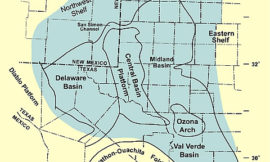The 2020 presidential election is looking to have a big impact on energy policy in the United States. In this episode we speak with Alex Epstein, author of NY Times bestselling book The Moral Case for Fossil Fuels, to help us look at the big picture around energy and environmental issues.
On one side, Donald Trump looks to continue the theme of continuing the energy revolution in the United States with a focus on economic growth, and on the other side, Joe Biden’s plan will mandate carbon-free power generation by 2035. In the middle, Jo Jorgensen’s plan looks to removing barriers for new nuclear power plants and eliminating all energy subsidies.
With all of the political rhetoric, it is hard to know who to believe and most importantly, how these policies might affect us and our families. For mineral rights and royalty owners, it seems clear that Biden’s plan of banning new oil and gas permitting on public lands could have a negative effect on our property values but what is really happening around climate change and the environment?
When it comes to energy and the environment and being able to understand both the positive and negative effects of any technology, it is important to look at the data in an objective manner. And this is exactly where this week’s guest comes in.
Alex Epstein is a philosopher who argues that “human flourishing” should be the standard of value when assessing industrial and environmental progress.
Using the embedded player above, you can download the episode to your computer or listen to it here! Be sure to also subscribe on iTunes!
About Our Guest
Alex Epstein is a philosopher who argues that “human flourishing” should be the guiding principle of industrial and environmental progress.
He founded the Center for Industrial Progress in 2011 to offer a positive, pro-human alternative to the Green movement.
Alex is the author of The Moral Case for Fossil Fuels, a New York Times bestseller who argues that if we look at the big picture, human flourishing requires that we use MORE fossil fuels not less. The book has been widely praised as the most persuasive argument ever made for our continuing use of fossil fuels.
Most recently, Alex created the website EnergyTalkingPoints.com to provide true, powerful, and succinct talking points on this year’s most important energy, environmental, and climate issues.
The Moral Case for Fossil Fuels
We cover a lot of area in this conversation but it all starts with the moral case for fossil fuels and the competing philosophies of “human flourishing” vs. “unchanged nature.”
- Why Alex decided to write a book on fossil fuels.
- The big picture view of energy provided in the book and what is driving the bias against fossil fuels.
The Climate Movement
- We then talk about Michael Moore’s film Planet of the Humans and some of the issues around “renewables” or “unreliables” as Alex calls them.
- Are climate change alarmists like Bill McKibbon and Al Gore motivated by profit in the transition from fossil fuels to renewables as Moore insinuates in his film?
- What else is driving the one-sided view against fossil fuels?
Private Property Rights
In The Moral Case for Fossil Fuels, Alex mentions the history of pollution law and the competing approaches of protecting individual’s rights to be protected from pollution while recognizing the right “to pursue a modern, industrial life along with the energy that life requires.”
Since the main focus of The Mineral Rights Podcast is centered around the subject of private property rights as it relates to the minerals and energy below the surface of the earth, we talk about this subject as it relates to allowing humans to flourish.
This is especially important with the discussions around increasing setbacks as part of SB19-181 which would make most private land off-limits to future oil and gas development in Colorado.
- How environmental groups and climate alarmists seem dead set on stopping the use of all fossil fuels and how it would result in the theft of property rights under the guise of protecting the environment and ironically protecting humans.
- From a philosophical point of view, who should decide how the land is to be used and is there a way to do this harmoniously?
- What we can do as mineral owners to protect our property rights (in addition to reading The Moral Case for Fossil Fuels, where Alex has a lot of practical tips on this at the end of the book).
Energy Talking Points
With the 2020 presidential election on the horizon, Alex created EnergyTalkingPoints.com “to provide true, powerful, and succinct talking points on this year’s most important energy, environmental, and climate issues.”
- Why he created this website.
- How it has been received by the public and by political candidates.
What You Should Know about Fracking (Frac’ing)
- With frac’ing as a big issue with Biden’s energy plan, we often hear about the costs of frac’ing but never the benefits.
- What you should know about frac’ing and the misinformation that is being spread about it.
- The potential economic impacts of a frac’ing ban in the US from a macro point of view. Example of a few of Alex’s talking points on Frac’ing:
- Talking point: “A ban on fracking would take the same percentage of oil off the market as the 1973 Arab oil embargo did. That incident more than quadrupled oil prices and triggered a global recession. A smaller oil incident in 1979 also triggered a global recession.7”
What You Should Know about CO2 Emissions
We then talk about net-zero carbon emission targets. Here are a few of Alex’s talking points on CO2 Emissions:
- “Many Democratic politicians claim that if America rapidly eliminates fossil fuel use, even at enormous cost, it will be worth it to lower CO2 levels and avoid a climate crisis. But the US causes less than 1/6 of global emissions—and falling.1“
- “America can also lower emissions and energy costs by lifting irrational restrictions on natural gas, such as anti-fracking policies and pipeline opposition. Yet Joe Biden and most Democrats want to stop fracking and new pipelines.5 6“
- “The fossil fuel bans and “renewables only” policies supported by most Democratic politicians will make American energy incredibly unreliable and expensive. That won’t stop CO2 emissions from rising but it will ruin the American economy.”
Energy Poverty
Another important issue right now is the economy due to the Coronavirus pandemic. It seems like we are on our way to an economic recovery but there are still a lot of Americans out there that are out of work and are struggling to just get by. Alex has talking points on the topic of energy poverty and You mention energy poverty on the website.
- What would the impacts be of government mandated “renewable” energy targets (e.g. wind and solar)?
- How can we best leverage the abundant supply of clean burning natural gas which is relatively cheap to help address energy poverty in the US?
- And a few of Alex’s talking points on the subject of Energy Poverty:
- “10s of millions of Americans live in energy poverty, meaning they experience hardship paying for their basic energy needs. 25 million US households say they’ve gone without food or medicine to pay for energy. 12 million say they’ve kept their home at an unsafe temperature.1“
- “US energy poverty should have decreased since 2008, when the price of natural gas–the fuel that powers most home energy use–started plummeting. But energy poverty is going up because we have added so much wasteful, unreliable solar and wind infrastructure to the grid.2 3“
Resources Mentioned in this Episode
- The Moral Case for Fossil Fuels (Penguin, 2014), a New York Times bestseller arguing that if we look at the whole picture, human flourishing requires that humanity use more fossil fuels not less. (WSJ review here.) The book has been widely praised as the most persuasive argument ever made for our continuing use of fossil fuels, winning Epstein the “Most Original Thinker of 2014” award from The McLaughlin Group.
- Alex’s EnergyTalkingPoints.com. “The goal of this site is to give you true, powerful, and succinct talking points on this year’s most important energy, environmental, and climate issues.”
- Alex Epstein’s Email List
How to Contact Alex
Thanks for Listening!
To share your thoughts:
- Leave a comment or question below (we read each one and your question may be featured in a future episode)!
- Ask a question or leave us feedback via email or voicemail: (720) 580-2088.
To help out the show:
- Leave an honest review on iTunes or wherever you get your podcasts – we read each one and greatly appreciate it. Plus, you can get a shout out on a future episode!
Thanks again – until next time!




Pingback: MRP 74: Mineral Rights News October 2020 – The Mineral Rights Podcast